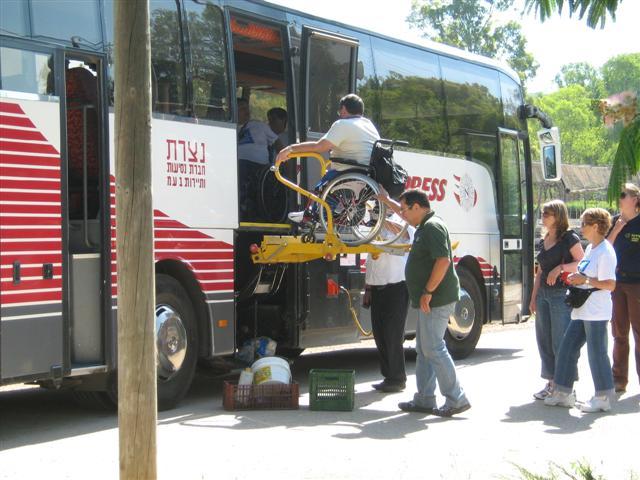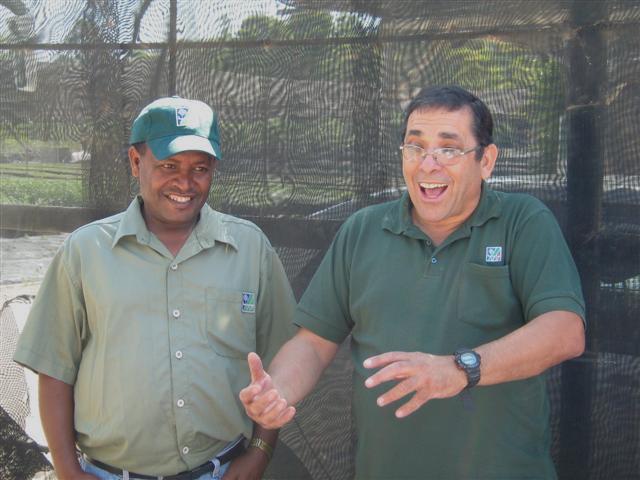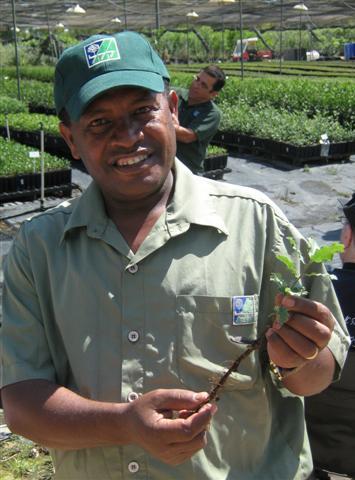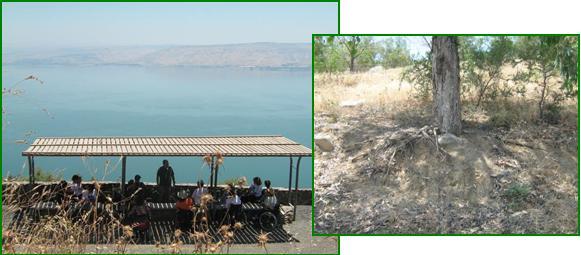At first glance, the bus that rolled into the parking lot at KKL-JNF Golani Junction Tree Nursery looked like any other bus bringing visitors to learn about the process of growing trees. But when a square platform opened up out of the side of the bus rather than a door, it became obvious that something special was going on. This was a bus specially accommodated to the needs of people with disabilities who are wheelchair bound. Eight volunteers from “Access Israel,” a non-profit organization dedicated to making Israel accessible to all its citizens – including the disabled – were invited by KKL-JNF to spend a day touring KKL-JNF sites in northern Israel and to provide feedback on the degree of their accessibility.

The group was greeted by former KKL-JNF Lower Galilee Community-Forest Coordinator Haim Katz, who was the group’s guide for the day, and by Heroi Amara, head of the Golani Junction Tree Nursery. Amara, as everyone calls him, took the group on a tour of the nursery and explained how trees are grown from seed to sapling. “KKL-JNF has three tree nurseries – Gilat in the south, Eshta’ol in the Judean Mountains and here at the Golani Junction in the north. Our nursery cultivates about 500,000 seedlings a year, mainly conifers and broad-leafed trees, in accordance with KKL-JNF’s current policy of planting mixed forests. Tree cultivation is a very exact science – we try to provide the perfect tree for each individual habitat so we monitor the entire process very closely, from the choice of each individual seed and onwards.”

Amara showed the group a Tabor oak seedling. “The acorn sends out a root and a sprout. Until the root system develops, the seedling is nourished by nutrients stored in the acorn itself. At the tree nursery we help nature with what it knows how to do best and suit the natural processes to our annual plan. It’s really breathtaking to realize that a tiny sprout will eventually grow into a thirty-meter tall eucalyptus tree.”

We met Dr. Revital Shurtz-Seversky, a biologist who heads Access Israel in the north, who described the organization’s goals. “We are a group of volunteers from the north who are involved in various activities related to accessibility in Israel. We check out various sites and buildings throughout the country for accessibility and talk to young people and other sectors of the population about our goals. Today’s trip was a KKL-JNF initiative. I received a phone call from KKL-JNF worker Eti Azuali, who asked us if we would check accessibility at sites in the north. She and Shalhevet arranged a bus suitable to our needs – one of the few like it in Israel. We have been looking forward to this day in nature and hopefully to make some practical suggestions.”
The group’s next stop was at a scenic lookout over Lake Kinneret in Swiss Forest, where Haim Katz, the group’s guide, with whom everyone had fallen in love by now, explained some of the dilemmas in planning sites accessible to the disabled. “Swiss Forest is the only place in Israel where the British mandatory law against erosion is still in effect. Due to the unique topographical and climatic conditions of the area around Lake Kinneret, there can be huge cloudbursts during the rainy season that cause terrible erosion and even landslides. It is hard to grow trees here because the erosion of land exposes their roots. In 1932, 29 people were killed in Tiberius as a result of a landslide. Someone asked me why we didn’t pave the road to the scenic lookout with asphalt rather than gravel, which would have been much easier for the wheelchairs. The answer is that asphalt prevents rain from seeping into the ground, thus rainwater would pour down the side of the hill and become a hazard – besides destroying the forest.”
Moshe Garnek from Haifa asked why the forest was called Swiss Forest, since, although the area was very beautiful, it was nothing like Switzerland, especially in the oppressive heat. “And it’s not even summer yet!” Haim responded. “The forest is named Swiss Forest for Friends of KKL-JNF from Switzerland, who not only contributed towards creating the forest, but also still provide an annual contribution to cover its maintenance.”

It was hard to leave the breathtaking view of the Kinneret but it was time to move on. The next stop was Elot Park, planted on ridge between Menahemya and Yavni’el overlooking the Jordan Valley. The bus took the group for a ride on the Forest Scenic Route, which traverses some of the most beautiful areas in Israel and offers many recreational and scenic opportunities along the way. Haim pointed out a small spring just off the forest scenic road that is a drinking spot for the herds of grazing cattle in the area. “KKL-JNF invites shepherds to bring their animals into the forest. They eat the low-growing vegetation thus helping prevent the spread of forest fires. The main word here is cooperation – we work together with the shepherds to make sure that the forest is not damaged.
“This forest park is also a project of KKL-JNF Switzerland. One of the donors has a daughter who is wheelchair bound so it was important for him to create a forest trail accessible to those in wheelchairs. When paving such a trail, our goal is to work with nature. The trail winds around to avoid cutting down even a single trees and every few meters one of the stones around the trail is lower than the others so that rain water can run off. A lot of thought goes into planning such a trail. The stones on the side make it easier for the visually impaired to navigate. Here, it is paved for wheelchairs and the incline is not too steep so that it isn’t a great effort to walk it. But I’ve probably talked enough. It’s time for lunch, so let’s follow the trail to a shaded recreation area.”
The group met KKL-JNF’s Etti Azulai at the picnic site and Revital had the opportunity to give her some feedback about the site. “The tables here are not suitable for people in wheelchairs. The benches block us from reaching the table so we have to eat off the benches themselves.” Haim and Etti promised to have tables and benches installed that are wheelchair-accessible as soon as possible. “So I guess we can eat now,” Revital laughed. “I think we have just earned our lunch.”
Avner Batist, who served in an elite IDF unit and is currently a writer, pointed out that the creation of accessible sites is beneficial not only for the disabled. “A trail like this is great for the elderly, for pregnant women and for families with baby carriages. One of the important points we impart to people is that everybody may need accessibility at some point in their lives. It’s very important to publicize sites like these – it increases public awareness of this need and also informs the public that there is a way to enjoy nature despite disabilities.”
Noga from Kiryat Haim, an investments consultant at Bank Leumi, said that her family has a jeep, which makes getting into nature easier for them. “The mere fact that KKL-JNF considers how to make trails or scenic lookouts accessible for the disabled is just great. One of the questions we ask is how one defines accessibility, which is why a day like today is so important: because the real test of accessibility is whether or not you can reach a certain site. Today’s trip proved that these sites indeed are suited to our needs.”
The last stop of the day was at the Aram Naharayim site on the Jordan River, where seven young girls were shot dead by a Jordanian soldier in March 1997 despite the peace agreement between the two countries. The late King Hussein came to Israel to comfort the bereaved families and the image of the king in the families’ houses will never be forgotten. Haim explained to the group how KKL-JNF was involved in developing and maintaining the site. Seven hills had been planted with seven different types of eucalyptus trees, each with a different colored flower, for each of the seven young girls.
Towards the end of the trip, Etti Azulai thanked the group for taking the day to tour the sites. “KKL-JNF is the first Green organization to put accessibility high on its agenda and we take your recommendations into consideration in future planning and development.”
Avner Batist spoke up on behalf of the entire group. “And we are going home with a huge ‘thank you’ in our hearts to KKL-JNF and to all the wonderful people who were here with us today.”
For Articles, comments or use please contact
Ahuva Bar-Lev
KKL-JNF – Information and Publications
Email: ahuvab@kkl.org.il
Phone: 972-2-65834936583354 Fax:972-2-6583493




